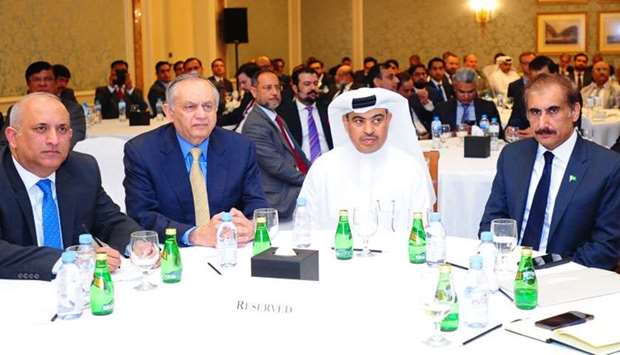With economic ties witnessing a strong momentum over the past 10 years, Qatar and Pakistan’s trade exchange stood at $2.6bn in 2018 – a more than 230% jump over the QR782mn recorded in 2016, HE the Minister of Commerce and Industry, Ali bin Ahmed al-Kuwari said on Sunday.
Speaking before the Qatar-Pakistan Trade and Investment Conference held in Doha, al-Kuwari said Qatar is home to 1,488 companies sharing Qatar-Pakistan joint capital in the energy, contracting, heavy equipment leasing, and plastics sector, while seven Pakistani companies are 100% wholly-owned.
Al-Kuwari called for the strengthening of economic and trade relations by holding regular trade fora and fairs, including more visits to boost both countries’ public-private partnerships.
Citing the significance of Sunday’s forum, al-Kuwari said he expects the forum will open more avenues for new creative ideas and facilitate trade and investment. Qatar, he noted, has become a regional trade platform due to its strategic location and world-class facilities.
“Qatar and Pakistan hold strong ties since the 1990s. Our relations have grown stronger due to official visits, such as that of the Prime Minister of Pakistan Imran Khan, who was here in January 2019. This reflected the willingness of both sides to support co-operation in many fields, especially in the economic field on a trade and investment level,” al-Kuwari said.
The minister said both countries will benefit from the ongoing agreements, which would fast-track the establishment of the Qatar-Pakistan Business Council to encourage the private sector to explore investment opportunities in both countries.
Al-Kuwari also emphasised Pakistan’s role in Qatar’s food security and self-sufficiency initiatives, saying he hopes the conference will help establish investment partnerships in the fields of industry and agriculture, including other economic sectors.
This was reiterated by Abdul Razzaq Dawood, adviser to the Prime Minister on Commerce, Textile, Industries & Production, who stressed that both countries could forge strategic alliances that would address Qatar’s food security needs through co-operation ties in the agricultural sector.
Dawood lauded Qatar’s investment climate in terms openness, transparency, and equality. He also called on the Qatari and Pakistani private sector to explore opportunities for bilateral projects to boost Pakistan’s exports to Qatar.
He expressed his appreciation for the strong partnership between Qatar and Pakistan, which imports gas as well as large number of petrochemical products from Qatar, and noted that Qatari exports contributed to Pakistan’s industrial growth.
“Trade volume between Pakistan and Qatar can be enhanced through increased business engagements,” said Dawood, who also encouraged Qatari investors to invest in Pakistan’s real estate, hospitality, petro-chemical, food, and agriculture sectors, among others.


